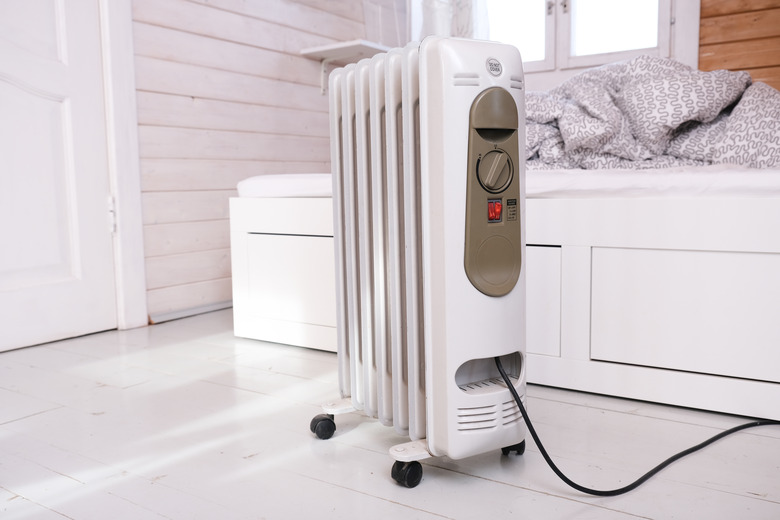The Dangers Of Oil Filled Space Heaters
We may receive a commission on purchases made from links.
When it's cold and you just need to heat a small space, an oil-filled space heater is a much safer alternative than many other types of space heaters, such as the old kerosene oil heaters or those that use propane or natural gas. All of those must be properly ventilated because they're capable of generating carbon monoxide, an odorless, colorless gas that can be lethal. But oil-filled space heaters, which are electrically powered, portable and use little electricity, still need to be used with caution.
Oil-Filled Space Heaters
Oil-Filled Space Heaters
Many older model space heaters are fire risks because they can tip over, burn those who touch them and must be refilled. New models of oil-filled space heaters generally have a safety switch that shuts them off if they tip over. Most also have automatic shutoff features to prevent the unit from overheating.
You can't see the oil in an electric oil-filled space heater. The oil and the heating element are inside a sealed container. That feature makes these heaters much safer than other portable space heaters. Most oil-filled space heaters also contain safety covers, which means if you accidentally touch the heater, you won't get burned.
Safety Features To Look For
Safety Features To Look For
When you buy an oil-filled portable heater, you want to look for an Underwriters Laboratories certified product, which will be displayed on the heater. That means the heater has been tested and meets industry standards for safety and quality. The Consumer Product Safety Commission also suggests using a new heater to ensure that safety features are up to date.
If you're using a heater that's not brand new, make sure the cord is in good shape and not frayed or broken. Also, make sure that you never plug it in with an extension cord or a surge protector. Most heaters indicate the size of the space they're meant to heat, so don't buy an oversized heater. If you're using an older model, make sure it has a tip-over safety switch and a cover to prevent children or pets from getting burned if they touch the heater.
Newer oil-filled heaters usually come in thermostatically controlled models. Oil-filled space heaters often resemble radiators that were once common in many houses built in or before the mid-20th century. Many newer models also come in flat panel designs that are lightweight and save space.
Heater Safety Recommendations
Heater Safety Recommendations
Anytime you're using a space heater, even an oil-filled space heater with a sealed element, there are certain safety procedures you must follow to prevent the possibility of fire. The National Fire Protection Association has these recommendations:
- Keep the heater 3 feet away from any object, such as sofas, chairs or curtains, and people.
- Place the heater on a flat, solid surface.
- Keep the heater out of the way of foot traffic.
- Never block an exit.
- Keep children and pets away from the heater.
- Plug the heater directly into the wall. Resist the temptation to use an extension cord or power strip.
- Don't run a space heater all night. Turn it off and unplug it when you leave the room or go to bed.
Remember, the Consumer Protection Safety Commission estimates that portable electric heaters are involved in 1,100 fires per year, resulting in about 50 deaths and millions of dollars in property loss. Those figures include all portable electric heaters, not just those that are oil-filled, but improper use is a major fire hazard. Following proper guidelines will keep your living space warm and your family safe.
References
- U.S. Department of Energy Office of Energy Saver: Portable Heaters
- Heater Home: The Do's and Don'ts of Radiator Heater Safety
- NewAir: 10 Reasons the Electric Oil Heater Is So Popular
- Consumer Protection Safety Commission: Your Space Heater Needs Space
- National Fire Safety Commission: Electric Portable Space Heater Safety
- Centers for Disease Control and Prevention: Carbon Monoxide Poisoning
- Underwriters Laboratories: Welcome to UL
